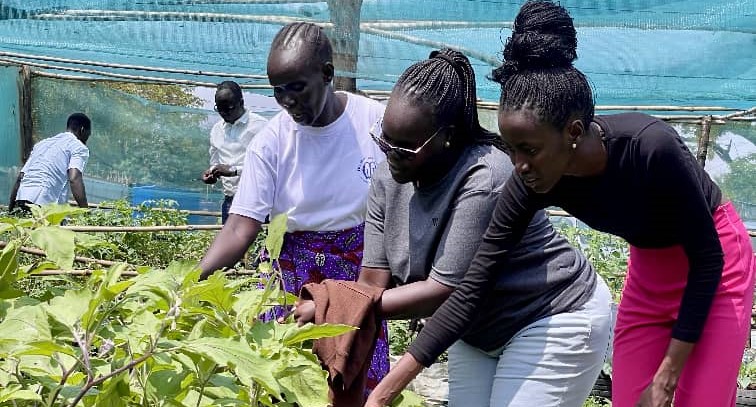As South Sudan grapples with economic hardships and the growing impacts of climate change, the Episcopal Church of South Sudan Environmental Network, a faith-based organization, has stepped in to empower local communities, particularly women in Juba, through climate-smart gardening and backyard farming initiatives aimed at reducing household expenditure on vegetables.
Speaking to Radio Tamazuj on Friday, Emmanuel Kenyi, the organization’s team leader, said they have trained around 150 people, including 80 women and 70 youth, on climate-smart gardening practices.
“We have trained many women on how to set up gardens in their homes. Even with small spaces, they can cultivate vegetables like eggplants, tomatoes, Sukumawiki, and maize,” he explained.
Kenyi emphasized that local food production can ease financial burdens and improve nutrition.
“With the current economic challenges, it is vital to make sure communities are enlightened on how to address food insecurity. When people are food secure, they can also contribute to nation-building,” he said. “We have received very good feedback, and some have already established gardens in their homes. It is encouraging to see them training others.”
To demonstrate practical solutions, the organization has established a climate-smart demonstration garden where people are trained to grow vegetables in small household spaces.
Kenyi noted that South Sudan’s traditional farming calendar has been disrupted due to unpredictable rainfall patterns.
While floods have made farming impossible in many areas, other parts of the country suffer from drought and delayed rainfall, leaving many without food. Kenyi said the organization aims to help urban residents adapt by cultivating in limited spaces.
He revealed that the Archbishop and Primate of the Episcopal Church of South Sudan, the Most Rev. Justin Badi Arama, founded the Environmental Network to align the Church’s mission with addressing climate-related challenges.
Kenyi, however, pointed out several challenges facing the initiative, including limited space, water shortages, and inadequate funding.
“Juba is a very dry place, and getting consistent water is a challenge. We encourage people to recycle water from household use, like dishwashing, to water their gardens,” he explained. “Funding is also a big constraint. Most of what we do is supported locally by the Church and the Archbishop’s office, but it is too little. We hope development partners can step in so we can scale up our operations.”
Kenyi urged the government and local communities to take urgent action to mitigate the growing impacts of climate change that threaten livelihoods, food security, and peaceful coexistence in the country.
For her part, Doreen Kwaje, a staff member and beneficiary of the training, praised the Episcopal Church of South Sudan Environmental Network for equipping them with practical skills to grow food even in small urban spaces.
“With this project and with the training that we have received in here, we have been told that we can use a small space at the back of our gardens, maybe even just somewhere in a corner. If you have a container, a bucket, a sack, or an old tire, you can fill it with soil and then plant seeds there,” she said. “Living in a city, with very small spaces, we can still make very good use of those spaces to grow vegetables for our daily meals.”
Her sentiments were echoed by Mario Nyeli, another beneficiary of the training, who emphasized the importance of backyard farming in easing the economic burden on families.
“If you have some small space in your compound, just get some tires and be able to plant tomatoes, eggplant, and okra,” Nyeli advised.
Conversely, Kenyi revealed that the organization has launched a tree planting program in line with the government’s environmental initiative.
“We have just planted 223 trees, but we are raising a very big tree nursery to make sure that we really roll out mass tree planting next year because that is now one of the programs of the Archbishop,” he said.
Through these efforts, the Episcopal Church of South Sudan Environmental Network hopes to build community resilience, promote sustainable farming, and contribute to a greener, food-secure South Sudan.




